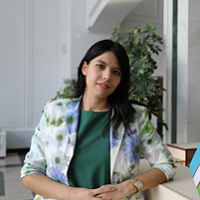BSc (Hons) in ECONOMICS AND ITS PATHWAYS
COURSE OVERVIEW
36,292,800 UZS
per year
54,600,000 UZS
per year
3 years
18
Course description
The BSc (Hons) in Economics and its Pathways course has been designed to give students an education in the key areas of the disciplines of economics, finance, and data science. The course enables students to understand the interactions between the economy and the financial system, providing an understanding of theories, tools, and techniques, fitting them to pursue a career in economics, finance, data science and other related areas. The combination of economics (major) with finance (minor) and data science (minor) provides an excellent platform for WIUT graduates to become successful in competitive job markets.
The structure of the course is developed in line with education for sustainable development which is part of the United Nation’s Sustainable Development Goals (SDGs). In particular, the course learning outcomes, learning and teaching methods and assessments contribute to all sustainable development goals.
The course aims to:
Produce graduates who understand the implications of the rapidly changing economic, financial, and digital developments.
Develop the knowledge, skills and capabilities required to respond proactively to contemporary issues and the challenges of the economic and financial environment.
Encourage students to reflect on the knowledge and assumptions that underpin their understanding of economics, finance, and data science and its policy implications.
Provide students with the opportunity to specialize in a range of areas for example international and development economics, labour and monetary economics, environmental and energy economics, behavioural economics, banking andfinance, data science and machine learning.
Promote the practical skills in quantitative analysis to collect, analyse and visualize the data, design surveys, detect trends, develop forecasts and relationships, and communicate the results to use in economic policy analysis, tackling financial and economic problems, evaluating investment projects, making recommendations to improve efficiency.
Introduce, explain, and apply the fundamental concepts in microeconomics and macroeconomics, international trade, and industrial organization along with more applied modules such as contemporary issues in global economics, applied policy analysis, behavioural economics, economics of financial crises and investment and risk management.
Course structure
This section shows the core and option modules available as part of the course and their credit value. Full-time Undergraduate students study 120 credits per year. Course structures can be subject to change each academic year following feedback from a variety of sources.
Core modules
-
Exploring Economics
-
Fundamentals of Statistics
-
Mathematics for Economists
-
Contemporary Issues in Global Economy
-
Corporate Finance* (Pathway Core for Economics with Finance)
-
Fundamentals of Programming* (Pathway Core for Economics with Data Science)
One Option or an Elective
-
Applied Mathematics for Economists
-
Financial Accounting
-
Introduction to Insurance Business
-
Banking and Finance in Context
-
Corporate Finance
-
Fundamentals of Programming
-
Introduction to Artificial Intelligence
-
Any module from the WIUT module catalogue
Award of Certificate of Higher Education available
How you will study
You will attend lectures, interactive classroom activities and seminars. There will also be visits from speakers in the form of guest lectures, as well as workshops and practical sessions. You will take part in activities such as problem-solving exercises, cooperative student projects, informal group work, simulations, case studies, and role playing. All these activities involve higher order thinking and the development of transferable graduate-level skills. Learning will be enhanced using a variety of media and technology, making it effective, varied, and enjoyable. The course is designed to offer opportunities to engage with corporate and public sectors before graduation, so that the students can develop skills alongside the ones you get from the rest of the course. These opportunities can be a formal part of the course, such as doing an industrial placement within the course or attending master classes or lectures by guest speakers with relevant professional practice.
Independent study is a key learning skill for academic study and for your future employability. As part of the BSc (Hons) in Economics and its Pathways course, you will be expected to work independently. This may take various forms: examples include group collaborative tasks, research, reading, revision, assessment preparation, projects that feed into presentation and debates, lab, or studio-based work. You will be encouraged, guided, and supported towards developing progressively increasing skills as an independent critically aware learner. You should expect each module to have both specified contact hours and independent learning. The hours may differ significantly depending on the specific subject matter, your level of study and the approach to teaching and learning.
Outside the curriculum, there is a set of student clubs, programme activities, workshops, and events taking place beyond the classroom walls and curriculum. You are encouraged to participate in such activities as they will enrich you as a person and contribute to your professional development.
Employment Opportunities
There is high demand for WIUT’s BSc (Hons) in Economics and its Pathways graduates since their professional performance is highly valued in the workplace by employers and other stakeholders.
WHY STUDY THIS COURSE?
ENTRY REQUIREMENTS
Entry requirements for the BSc (Hons) in Economics and its Pathways have been set to select potential students who have the proven academic ability undertake a UK undergraduate degree course. The admissions policy aims to attract and recruit motivated applicants across the full range of possible access routes. Students may have a background in any academic discipline. The over- riding principle upon which admission decisions are based is that applicants should be likely to benefit from and succeed on the course.
What are the minimum entry requirements for the course?
-
Successful completion of an appropriate International Foundation course; or
-
Successful completion of the first year of an appropriate degree course in a recognised Uzbek or similar university; or
-
Two GCE A level passes (in any subject excluding mother tongue), plus three GCSE passes at grade C or above including English Language and Mathematics; or NC/ND or HNC/HND. (The range of academic disciplines studied is not hereby restricted, but certain vocational courses such as City and Guilds would not satisfy the admissions requirements.); or
-
An Advanced General National Vocational Qualification (GNVQ); or
-
Any other equivalent qualification normally accepted as entry requirements (e.g. International Baccalaureate, etc.).
Applicants must have:
-
Had their secondary education through the medium of English and gained grade C or above in the equivalent of GCSE English; or
-
An IELTS score of 6.0 with a minimum of 6.0 in the writing component or another English Language Test recognised by the University of Westminster; or
-
Successfully completed an appropriate International Foundation course with a "pass" in an Academic English module.
We accept the TOEFL (IBT (In person test) for entry to our programmes. We also accept TOEFL ‘My Best Scores’ where it relates to TOEFL iBT test results.
Please note that the TOEFL Home Edition (Online test) is not accepted for entry to WIUT degree programmes.
-
TOEFL should be 78 overall with a minimum of 17 in Writing
Applicants must have an acceptable level of competence in Mathematics. This could be demonstrated by one of the following:
-
A “pass” in a math test approved by the University of Westminster; or
-
Grade C or above in GCSE/’O’ Level Mathematics (or its equivalent); or
-
SAT mathematics component 570; or
-
Successfully completed an appropriate International Foundation course with “pass” in Quantitative Methods module.
- Applicants will have to be 18 years of age at the start of the academic year. For the purposes of this regulation, the academic year runs from 1st October to 30th September of the following year.
- Applications are normally processed based on the documentation submitted on the WIUT admissions system. The University reserves the right to introduce other admission processes such as an interview.
CAREERS
An Economics with Finance degree increases the employability of graduates in various fields.
There is strong demand for highly qualified economists and financial experts both in local and global labour markets, including the public and private sectors, multinational organisations, NGOs and others.

COURSE LEADER
Bilol Buzurukov
Bilol received his PhD in Economics from Yeungnam University, Republic of Korea. Before joining the Westminster International University in Tashkent, he was a Researcher at the Department of Economics and Business, Yeungnam University.
His research areas are Economics of Migration and Economics of Corruption. He is the author of several international journal articles and teaches Contemporary Issues in Global Economy, Behavioral Economics and Macroeconomics modules.
Course team
WHAT OUR GRADUATES SAY

Paris, France
The program provided an excellent foundation for my academic and professional journey. It is an ideal choice for anyone starting their undergraduate studies, regardless of their future career path. After graduation, I began my career as a Credit Analyst at Korean Development Bank, where I found many modules taught during the course extremely useful in my job. Three years later, I pursued a Master's degree in Data Science. To my surprise, no matter which machine learning model we studied, I discovered fundamental concepts—such as eigenvalues, Markov processes, and positive definiteness—taught in WIUT's mathematics and statistics classes.
My career then transitioned into the field of Data Science and Artificial Intelligence. I worked at Artefact Middle East as a Data Scientist, contributing to cutting-edge AI applications, including robotic systems, customer support chatbots, and satellite imagery analysis. Currently, as a Data and AI Manager at PwC Dubai, I lead teams to create efficient and scalable Generative AI and Machine Learning solutions. These experiences have demonstrated that the foundational skills and knowledge I gained during my undergraduate studies have been instrumental in shaping my career.

Tashkent, Uzbekistan
Tashkent, Uzbekistan
WIUT is an excellent University providing many opportunities for students. BSc in Economics and Finance, encompassing multiple areas of economics, prepared me well for my current employment. The course helped me advance as a researcher, a critical thinker and a confident specialist.
During my career in the Finance Ministry and later at NASP, I encountered complex tasks that included evaluation, econometric analysis, computable general equilibrium, data analytics, business process reengineering, and forecasting. I take pride in being part of the team that helped digitalize the assignment and payment procedures for social benefits. Currently, my work impacts millions of families in Uzbekistan, and together with my team, we strive to make social protection more accessible.

Tashkent, Uzbekistan
Durham, UK
Durham, UK
Studying at WIUT was a transformative experience that shaped both my academic and personal growth. The academic staff were not only knowledgeable and responsible but also passionate about their teaching, delivering engaging lectures and practical seminars that inspired me and provided a strong foundation for my postgraduate studies at Durham University, where I obtained an MSc in Finance.
As an international student, I was deeply impressed by the supportive and inclusive atmosphere at WIUT. My tutors and course mates were always supportive, whether I faced challenges in my studies or in adapting to a new environment. This nurturing community played a vital role in making my time at WIUT both enriching and enjoyable.
After completing my postgraduate programme, I had the opportunity to stay in the UK and work in a Finance role at Durham University, where I continue to grow both personally and professionally. Reflecting on my time at WIUT, I can confidently say that the experience provided me with a strong foundation and invaluable memories that I will always cherish.

Goettingen, Germany
Munich, Germany
My studies at Westminster International University in Tashkent provided me with a strong foundation in economics, statistics, and mathematics. During the final year of my bachelor’s program, I was awarded a German Academic Exchange Service scholarship (DAAD) to support my master’s degree studies at one of Germany's leading universities. At the University of Göttingen, I found myself well-prepared for an internationally competitive academic environment, which allowed me to graduate with first-class honors. In my current role as a PhD candidate and research associate at the Technical University of Munich, I continue to actively apply my knowledge of development and public economics in both research and teaching.

Tashkent, Uzbekistan
Board of Directors Member at Samarkand Darvoza, Compass and Riviera Mall
Tashkent, Uzbekistan
WIUT’s Economics with Finance Bachelor’s Course is an ideal course if you wish to jumpstart your career in finance, as well as retain an option of pursuing an academic degree abroad. I believe WIUT offers the best mix of extracurricular and academic activities in Uzbekistan for you to both grow as a person and become a professional with strong interpersonal skills. The Course helped me to quickly advance my career in finance by granting me flexibility to both try my career in Big 4 audit, where accounting skills are required, as well as in private equity where economic analysis is part of the investment decision making process.











